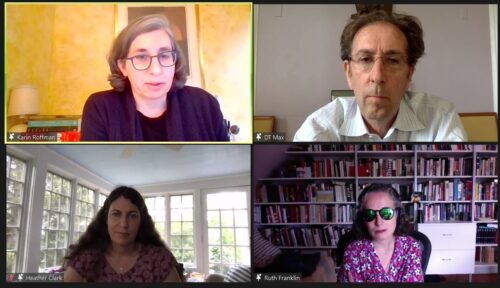Writing About Writers
Literary biography is one of the more popular subsets of the biography genre. Moderator Karin Roffman (who wrote a biography of the poet John Ashbery) started this session by asking the panelists how they chose the authors they wrote about.
For Heather Clark, it was a progression from doing an academic study of Sylvia Plath (along with Ted Hughes) to writing Red Comet: The Short Life and Blazing Art of Sylvia Plath, fueled in part by Clark’s awareness that new material was available on Plath. She also believed that some earlier biographers had taken a “sensationalistic” approach to Plath’s life “and it was time for a more literary, critical biography.”
Ruth Franklin had been writing book reviews when she decided she wanted to delve more deeply into writers’ lives and motivations, and Shirley Jackson was someone she had been thinking about. An earlier biography of the author hadn’t explored Jackson’s creative process in the way Franklin wanted to. Franklin was also intrigued by Jackson’s autobiographical writing about her life as a mother, and she wanted to balance that with looking at Jackson’s much darker fiction, and the challenges of being a creative woman at a time when American culture glorified the housewife.
Like Clark, D. T. Max had written about his subject, David Foster Wallace, before undertaking a biography. Max wrote about Wallace for The New Yorker shortly after the author’s death. That project made Max eager to read more of Wallace’s work and tell his story in greater depth.
Writing about writers, Roffman suggested, requires a strategy for how to balance the subject’s life with their work, and how the life shapes the creative output. Clark said she thought about those issues “every single day as I was writing.” Given her background as an English professor, Clark said she had to resist the temptation to go into the “literary critical weeds” and she had to remind herself she was writing a biography. Clark kept in mind the question: “How did Plath become the writer she was?” And she didn’t want to make the book a story of suicide and depression, as she saw Plath’s life as one of “ambition, and achievement, and triumph.” Clark wanted readers to see Plath as a writer, not a case study.
Franklin said she didn’t have an easy answer for finding the life/work balance, but after she was several years into her research, she developed an intuitive sense of what was important and where things should go. One of her goals was to show readers that Jackson was more than just the author of the famous short story “The Lottery.” Franklin also said that it’s easy to “develop blind spots either way” when considering the life/work mix. Max saw the process as a “three-part drama” between the life, the work, and the biographer. Max’s background as a journalist had previously made him focused on winnowing down source material. With the biography, he had more space to look at Wallace’s work in greater depth. Max wanted, in part, to help readers who might not know Wallace’s work to understand why he was worth caring about.
Roffman asked the panelists how they worked with letters as a source—gathering, choosing, deciding what to quote. Wallace does not have an archive, so Max simply asked the people he interviewed if they had any letters. He realized that letters Wallace wrote might not have been completely honest, but they offered a different perspective from his public writing and interviews. Clark said that she loves to quote from letters, but with the Plath book she didn’t have a set method for what to use. “If I have that ‘aha’ moment, my reader will, too,” she said. When weighing the honesty of a letter’s content, Clark said she had to consider Plath’s audience: she was more likely to write honestly to her psychiatrist than to her mother. Franklin said that Jackson’s archive didn’t have many letters, but she found more in the archive of her husband, Stanley Hyman. Some of the letters in Jackson’s archive focused more on family and domestic issues, not her literary work. In trying to find letters, Franklin searched through the archives of people she knew Jackson communicated with, “but a lot of times I turned up dead ends.” She thinks this is often the case with women subjects—their papers are not saved, or are under the name of the subject’s husband or under “the amorphous category of ‘family papers.’” Franklin considers it a tragedy that so much women’s literary history has been lost.
